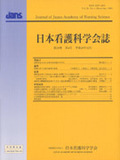Japanese
English
- 販売していません
- Abstract 文献概要
- 参考文献 Reference
- サイト内被引用 Cited by
要旨
透析患者の信念を健康統制所在(JHLC)および不合理な信念(JIBT)で測定し,特性およびセルフケアとの関連を明らかにした.228名の透析患者を対象に質問紙調査を実施し,「生活」と「食事」を下位尺度とするセルフケア尺度を開発の上,対象者の特性・信念との関連を統計的に分析した.その結果,セルフケア度の得点は,服薬に関する項目が最も高く,適度な運動の実施に関する項目が最も低かった.セルフケア度の「生活」と外的HLCに相当するJHLCの下位尺度「家族」・「運」・「専門職」との関連では,外的HLCが高いほど「生活」の得点が高かった.セルフケア度の「食事」とJHLC・JIBTには関連がなかった.以上,事例で示されることが多い透析患者の信念とセルフケアとの関連を量的に検討したことにより,患者がうまくセルフケアの「生活」を行えていない場合には,「家族」への働きかけ,「専門職」からの働きかけなどが有効である可能性が考えられた.
Abstract
This study is intended to clarify relationships of characteristics, beliefs, and self-care in patients receiving dialysis. To determine the beliefs and self-care of 228 patients, they were assessed using a questionnaire, the Japanese Health Locus of Control (JHLC) scale, and the Japanese Irrational Belief Test (JIBT), and an original self-care scale,which has two subscales, “Life”and “Diet”. Associations among characteristics, beliefs, and self-care were examined using Pearson's correlation and Student's t-test. Consequently, regarding the self-care score, the item related to dosing was the highest;the item related to appropriate exercise was the lowest. Significant correlation (p<0.05) was also found:“Life”of self-care and “Family”, “Chance”, and “Professional”of JHLC, which are equivalent for external HLC were correlated. However, “Diet”of self-care was unrelated to JHLC and JIBT. Heretofore, the beliefs of dialysis patients and relationships with self-care have tended to be told anecdotally. Results of this quantitative study suggest that, in cases where patients cannot do “Life”of self-care well, contact with families and their encouragement by professionals is considered valuable.
Copyright © 2008, Japan Academy of Nursing Science. All rights reserved.


